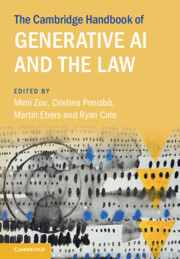Book contents
- Frontmatter
- Contents
- Figures
- Tables
- Contributors
- Foreword
- Preface
- Part I Understanding Generative AI from Multidisciplinary Perspectives
- Part II Evolving Regulatory and Governance Frameworks
- Part III Generative AI
- 14 Generative AI and Non-discrimination Law in the EU
- 15 Generative AI and Data Protection
- 16 Generative AI and the Fundamental Limitations of US Privacy Law
- 17 Generative AI and IP Under US Law
- 18 Copyright and Generative AI in Japan and China
- 19 Redefining Rivalry
- 20 Regulating Hypersuasion
- 21 Generative AI Systems and Corporate Governance, Compliance and Liability
- 22 Generative AI and Criminal Guilt
- Part IV The Use of Generative AI in Legal and Related Sectors
19 - Redefining Rivalry
Generative AI and the Evolving Landscape of Competition Law
from Part III - Generative AI
Published online by Cambridge University Press: 08 August 2025
- Frontmatter
- Contents
- Figures
- Tables
- Contributors
- Foreword
- Preface
- Part I Understanding Generative AI from Multidisciplinary Perspectives
- Part II Evolving Regulatory and Governance Frameworks
- Part III Generative AI
- 14 Generative AI and Non-discrimination Law in the EU
- 15 Generative AI and Data Protection
- 16 Generative AI and the Fundamental Limitations of US Privacy Law
- 17 Generative AI and IP Under US Law
- 18 Copyright and Generative AI in Japan and China
- 19 Redefining Rivalry
- 20 Regulating Hypersuasion
- 21 Generative AI Systems and Corporate Governance, Compliance and Liability
- 22 Generative AI and Criminal Guilt
- Part IV The Use of Generative AI in Legal and Related Sectors
Summary
This chapter examines the transformative effects of generative AI (GenAI) on competition law, exploring how GenAI challenges traditional business models and antitrust regulations. The evolving digital economy, characterised by advances in deep learning and foundation models, presents unique regulatory challenges due to market power concentration and data control. This chapter analyses the approaches adopted by the European Union, United States, and United Kingdom to regulate the GenAI ecosystem, including recent legislation such as the EU Digital Markets Act, the AI Act, and the US Executive Order on AI. It also considers foundational models’ reliance on key resources, such as data, computing power, and human expertise, which shape competitive dynamics across the AI market. Challenges at different levels—including infrastructure, data, and applications—are investigated, with a focus on their implications for fair competition and market access. The chapter concludes by offering insights into the balance needed between fostering innovation and mitigating the risks of monopolisation, ensuring that GenAI contributes to a competitive and inclusive market environment.
Keywords
Information
- Type
- Chapter
- Information
- The Cambridge Handbook of Generative AI and the Law , pp. 317 - 346Publisher: Cambridge University PressPrint publication year: 2025
